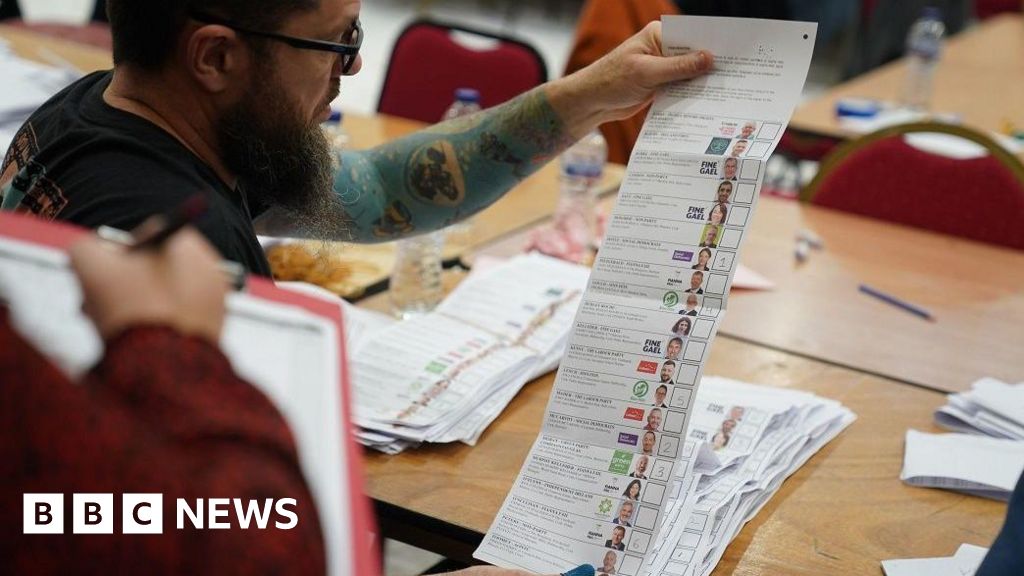
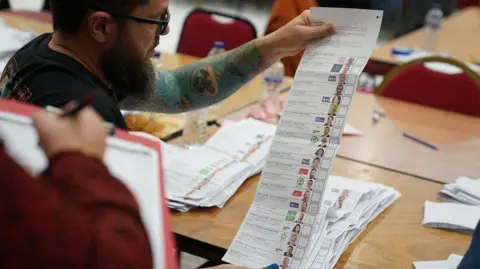 PA Media
PA MediaMore than half of the Irish parliament’s seats are filled, with the Fianna Fáil party leading a tight three-way battle in the country’s general election.
With all 43 constituencies’ initial counts in, first preference percentage share for the largest three parties is: Fianna Fáil 21.9%, Fine Gael 20.8%, Sinn Féin 19.0%.
So far, 101 of 174 seats have been filled, with counting having resumed on Sunday morning.
Fianna Fáil, who had been in a coalition government with Fine Gael and the Green Party, is being projected to win the most seats.
Counting resumed on Sunday morning in the election which had a turnout of 59.7% – the lowest in more than a century.
The leaders of the three main Irish political parties were all re-elected on Saturday to serve in the Dáil (lower house of Irish parliament).
Micheál Martin of Fianna Fáil, Simon Harris of Fine Gael, and the Sinn Féin leader Mary Lou McDonald have overcome their first obstacles by retaining their seats.
Now, they all face an even bigger challenge – to try to form the next government.
- Follow live updates from the Irish general election here.
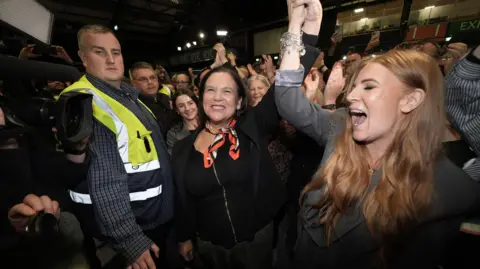 PA Media
PA MediaLabour Party leader Ivana Bacik has also been re-elected in the Dublin Bay South constituency.
Social Democrats party leader Holly Cairns and Independent Ireland leader Michael Collins retained their seats in the Cork South West constituency, and
Aontú leader Peadar Tóibín has been re-elected in West Meath and Richard Boyd Barrett from People Before Profit-Solidarity has been returned for the Dún Laoghaire constituency.
The Green Party’s Roderic O’Gorman is the last major party leader awaiting his final vote. He is running for Dublin West.
On Saturday, O’Gorman told reporters it was “clear” his party “has not had a good day”. Overall, he said the Greens have had a disappointing result.
On Sunday evening, former Green party deputy leader and Minister for Tourism, Culture, Arts, Gaeltacht, Sport and Media Catherine Martin was eliminated in the Dublin Rathdown race.
 PA Media
PA MediaFianna Fáil and Fine Gael have served together in the outgoing government, and after the first day of counting votes, they seem well placed to return to government.
If they agree to do so, they may need the support of one of the smaller parties or a number of the many independent TDs who are expected to be elected as the counting of votes continues on Sunday.
Sinn Féin says it also wants to be in the next government, and the party is ready to speak to other parties and independents.
But, based on current predictions, the scale of the challenge facing Sinn Féin is enormous.
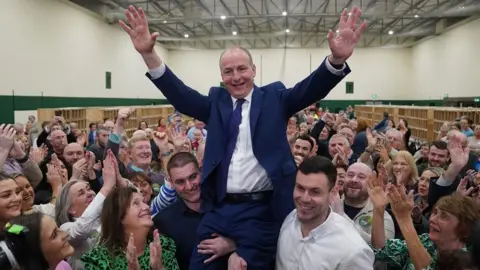 PA Media
PA MediaPolitical pundits are currently predicting that Fianna Fáil and Fine Gael could secure a combined total of more than 80 seats – within touching distance of the golden figure of 88 TDs needed to secure a majority in the Dáil.
The same pundits believe Sinn Féin could secure around 40 seats.
But even if it achieves that, it will still be well short of what is required for a Dáil majority.
In that case, Sinn Féin would have to look towards the smaller parties and independents.
However the smaller parties are expected to be in single figures when all their TDs are finally confirmed.
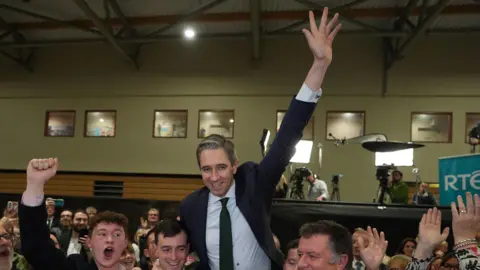 PA Media
PA MediaIf Sinn Féin turns to independents, it will find a very disparate cohort of TDs.
To find common cause in such a situation will be another big challenge for the party.
To compound matters, Fianna Fáil and Fine Gael have insisted that they are not interested in sharing power with Sinn Féin because of fundamental policy differences on a range of issues.
There is a widespread belief that negotiations to form a new government may go beyond Christmas and into the new year.
 Reuters
ReutersAfter being one of the most hotly talked about stories of this election, independent candidate Gerry Hutch has officially lost out in the constituency of Dublin Central.
At one point he had a 2,000 vote lead on Labour’s Marie Sherlock, but she overtook him after a series of transfers from eliminated Green Party and Fianna Fáil candidates.
A win for Hutch would have been highly notable – last year he was acquitted of a high-profile murder when a man was shot dead at a boxing weigh-in event. A judge has described him as having been involved in serious criminal conduct in the past.
Hutch says he would run again
Analysis – BBC News NI political editor Enda McClafferty
Gerry Hutch may feel robbed after being hotly tipped to secure a seat in Dublin Central.
But he didn’t appear sore about his defeat when he arrived at the count centre at the RDS.
Besieged by journalists, the gangland figure made his way through the hall to congratulate Labour’s Marie Sherlock who pipped him to the final seat.
He is known as a man of few words, but when asked by BBC NI if he planned to run again for election he said he would.
“I have been running all my life so yes I would go again,” he said
He also said he wasn’t surprised by the more than 3,000 first preference votes he received.
“I expected more to be honest,” he said
He was challenged about his criminal past but refused to answer any questions.
After shaking hands with Sherlock, he left the centre surrounded by journalists and ended up running away from the building to escape the media attention.
So where did it go wrong for the man poised to be the story of the Irish general election?
The key moment came when Social Democratic candidate Gary Gannon got elected much earlier than expected.
Transfers from the eliminated People Before Profit candidate propelled him to the quota.
That set in motion a series of transfers from eliminated Green and Fianna Fáil candidates which allowed Labour’s Marie Sherlock to close the gap with Hutch.
The surplus from Paschal Donohoe was finally enough to push her past Hutch securing the last seat.
But as one tally expert suggested it could easily have turned in favour of Hutch and while there was a narrow path to victory for Sherlock no-one expected her to find it.




